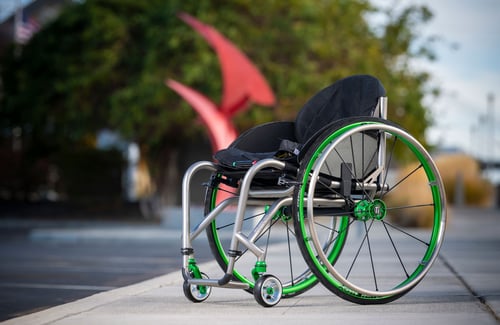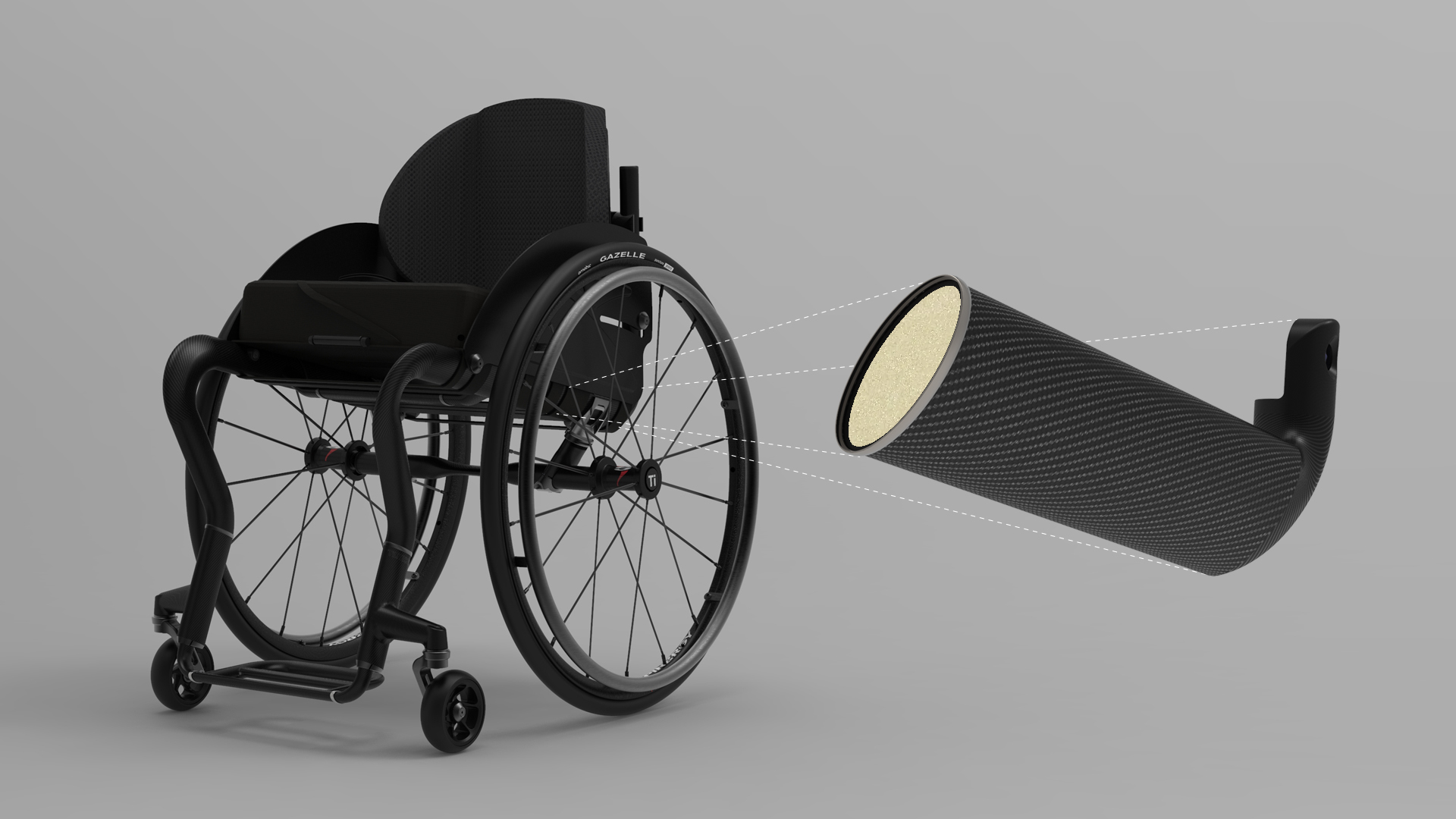On December 15, 2016, Durable Medical Equipment Medicare Administrative Contractors (DME MACs) released a policy that prohibited upgrades for titanium wheelchairs, which prohibits suppliers from billing for an upgrade to a wheelchair. As result, the only avenue for beneficiaries to obtain the titanium or carbon fiber wheelchairs is to pay for the entire wheelchair out of pocket and for the Durable Medical Equipment (DME) supplier to file a non-assigned claim to the Centers for Medicare & Medicaid Services (CMS) for partial reimbursement. This has detrimentally affected access for titanium and carbon fiber wheelchairs.
A groundbreaking bill, H.R. 5371, known as the Choices for Increased Mobility Act of 2023, was recently presented in the U.S. House of Representatives. This bill offers a remarkable opportunity for Medicare beneficiaries to enhance their mobility through the use of ultralightweight wheelchair frames made of carbon fiber or titanium. Introduced by Rep. John Joyce (R-Pa.) and co-sponsored by Congresswoman Michelle Steel (R-Calif.), this legislation aims to revolutionize the options available to individuals seeking greater independence. It represents a significant step forward in empowering Medicare recipients to access cutting-edge technology and enjoy the numerous benefits provided by carbon fiber or titanium wheelchair frames.
Background
Currently, there are two ways in which DME suppliers may file claims: “assigned”, which means that the Medicare allowable is accepted as payment in full and “non-assigned,” in which the supplier collects their usual and customary charge up front from the beneficiary, files the claim, and then the beneficiary is reimbursed less their co-pay and applicable deductible. Non-participating suppliers may file non-assigned claims if the Medicare allowable for an item is not sufficient based on the cost of providing the item.
Prior to the DME MAC policy announcement in 2016, Medicare beneficiaries were able to access DME with features and benefits beyond the “standard” item that meets basic needs by paying for the difference in the standard vs upgraded item under an assigned claim. However, the 2016 policy change prohibited suppliers from billing upgrades under an assigned claim, thus driving upgrades under non-assigned claims where beneficiaries pay in full up front.

Current statutes permit Medicare beneficiaries to purchase or rent an updated item of DME, which is corroborated by the Medicare Claims Processing Manual, that states: “An upgrade may be from one item to another within a single Heath Insurance Common Procedure Coding System (HCPCS) code or may be from one HCPCS code to another. When an upgrade is within a single code the upgraded item must include features that exceed the official code descriptor for that item.” Titanium and carbon fiber wheelchairs meet this description but are prohibited from being allowed as upgrades.
Wheelchair manufacturer and other stakeholder groups engaged CMS’ Division of DMEPOS Policy to share concerns, but CMS remained firm in their assertion that these upgrades are not permitted.
UPGRADES WITHIN A CODE BENEFITS END USERS
Individuals should have the ability to choose whether a titanium or carbon fiber wheelchair is right for them. The legislation to enable upgrades within a code removes the current obstacles in place, offering key benefits to end users at no additional cost to CMS:
- Enabling choice of product that’s best suited for one’s medical, functional, and lifestyle needs and preferences.
- Carbon fiber and titanium wheelchairs are a stronger, lighter material than the standard aluminum lightweight wheelchairs in HCPCS Code K0005. Its decreased weight makes it easier for end users to transport their equipment, such as putting the wheelchair in a vehicle, and helps prevent shoulder breakdown when self-propelling.
- Removes financial barriers that may prevent individuals from being able to get a titanium/carbon fiber wheelchair.
- Currently, Medicare beneficiaries’ financial burden is increased significantly by having to pay in full for the wheelchair, cost of upgrades, and any related wheelchair accessories while waiting for CMS to reimburse the allowable less co-pay. Suppliers may not fragment their billing – meaning they cannot bill non-assigned for the wheelchair base and assigned on the medically necessary accessories and seating.
- This may also delay beneficiary access to necessary equipment while Medicare beneficiaries are securing funding to make this up-front payment.
- In contrast, enabling upgrades within a code would reduce the financial burden by only requiring Medicare beneficiaries to pay the 20% co-pay and cost of the upgrade.
- Promotes investment in research and development and innovation for consumer-centric technological advancements to market by manufacturers.
UPGRADES WITHIN CODE SUPPORTED BY DME INDUSTRY
Manufacturers and suppliers of durable medical equipment support this policy change as it allows them to develop and provide products and services that promote the best possible outcomes for everyone. Rehabilitation Engineering and Assistive Technology Society of North America (RESNA) standards of practice for assistive technology professionals (ATP) include keeping paramount the welfare of those served professionally and informing the consumer about all device options available. Upgrades within a code create a pathway for consumers to access device options which may be unavailable to them otherwise. Allowing upgrades within a code also enables DME suppliers to provide client-centered services, prioritizing the needs and preferences of the end user in offering solutions to maximize their medical, lifestyle, and functional outcomes.
We encourage you to contact your representatives in Congress asking them to support this legislation. Click here to find your local representative.
.jpg?width=250&height=285&name=Jim%20Stephenson%20Small%20(4).jpg) Jim Stephenson
Jim Stephenson
Reimbursement and Coding Manager
Jim Stephenson is the Reimbursement and Coding Manager at Permobil. Over the past 25 years, he has worked on all sides of the healthcare reimbursement spectrum, the last 15 years in the CRT/DME industry. His broad background has provided him with vast experience and a unique perspective in working with funding sources, providers, physicians/clinicians and consumers. He is currently a member of the DME MAC Advisory Councils, the Complex Rehab and Mobility Council (CRMC) and the Regulatory Council for the American Association for Homecare. At Permobil, he works closely with the product development, government affairs, clinical education, sales and marketing teams. His responsibilities include: assisting providers with their coding and billing inquiries, providing support to the sales and customer service staffs and staying abreast of the ever-changing complex rehab industry.

